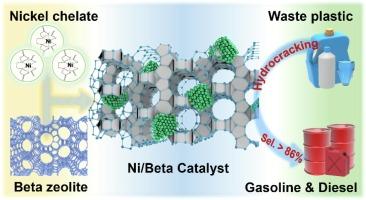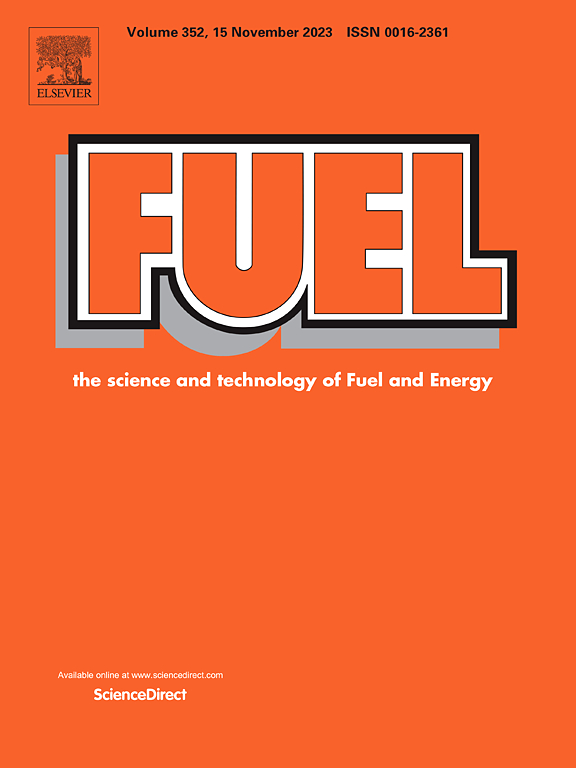设计不含贵金属的镍催化剂,在温和条件下利用废弃聚烯烃高效生产液体燃料
IF 6.7
1区 工程技术
Q2 ENERGY & FUELS
引用次数: 0
摘要
聚烯烃废料虽然对环境构成威胁,但也具有作为碳原料的潜力。水转化技术有望将聚烯烃废料直接转化为液体燃料,但贵金属催化剂的高昂成本或贱金属催化剂的低劣性能阻碍了该技术的实用性。本研究介绍了一种 0.5Ni/Beta 双功能催化剂,其特点是在 Beta 沸石上形成细小的镍纳米颗粒(3 纳米,负载量为 0.5 wt%),是一种高效催化剂,可从多种聚烯烃中生产液体燃料。该催化剂的生产率高达 1643 gliquid∙gNi-1∙h-1 ,在 280 °C 下对液体燃料(C5-20)的选择性超过 86%,超过了最先进的无贵金属催化剂。由螯合剂控制的镍粒度以及镍与布氏酸位点的比例成为关键的性能描述指标。精确控制细小镍纳米颗粒的负载量(∼1%)不仅能增强(脱)氢功能,还能有效保持贝塔沸石的布氏硬度。镍/贝塔催化剂具有抗焦炭沉积和耐受各种典型杂质的特性,在实际应用中大有可为。因此,这种不含贵金属的 Ni/Beta 催化剂代表了不断发展的新一代催化剂,将推动利用塑料废料生产可持续液体燃料。本文章由计算机程序翻译,如有差异,请以英文原文为准。

Engineering noble metal-free nickel catalysts for highly efficient liquid fuel production from waste polyolefins under mild conditions
Polyolefin wastes, while posing environmental threats, also offer potential as carbon feedstocks. Hydroconversion techniques show promise in direct transforming polyolefin wastes into liquid fuels, yet practicality is impeded by the prohibitive cost of noble metal-based catalysts or the inferior performance of base metal alternatives. This study introduces a bifunctional 0.5Ni/Beta catalyst, featuring fine Ni nanoparticles (3 nm, 0.5 wt% loading) on Beta zeolite, as a highly efficient catalyst for liquid fuel production from diverse polyolefins. This catalyst achieves a notable production rate of 1643 gliquid∙gNi−1∙h−1 and over 86 % selectivity to liquid fuels (C5-20) under 280 °C, surpassing state-of-the-art noble-metal-free catalysts. Ni particle size controlled by chelators, along with the ratio of Ni to Brønsted acid sites, emerged as crucial performance descriptors. Precise control over the loading of fine Ni nanoparticles (∼1%), not only enhances (de)hydrogenation function but also effectively maintains the Brønsted acidity of Beta zeolites. The Ni/Beta catalyst exhibits resistance to coke deposition and tolerance to various typical impurities, showing promise in practical implementation. This noble metal-free Ni/Beta thus represents an evolving generation of catalyst, propelling sustainable liquid fuel production from plastic wastes.
求助全文
通过发布文献求助,成功后即可免费获取论文全文。
去求助
来源期刊

Fuel
工程技术-工程:化工
CiteScore
12.80
自引率
20.30%
发文量
3506
审稿时长
64 days
期刊介绍:
The exploration of energy sources remains a critical matter of study. For the past nine decades, fuel has consistently held the forefront in primary research efforts within the field of energy science. This area of investigation encompasses a wide range of subjects, with a particular emphasis on emerging concerns like environmental factors and pollution.
 求助内容:
求助内容: 应助结果提醒方式:
应助结果提醒方式:


